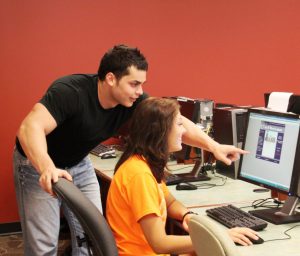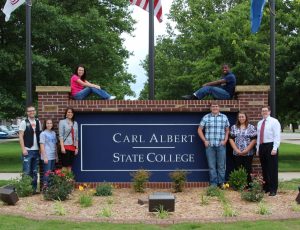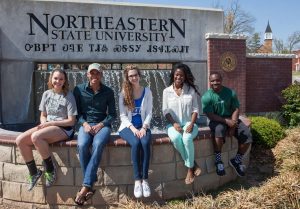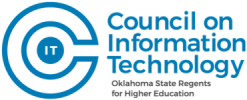Northeastern State University and Carl Albert State College
Location can be a major hindrance for those pursuing higher education. This obstacle is often present in small Oklahoma communities where the closest university might be several hours away. For many people, completing a degree can often be highly impractical, especially for nontraditional students.
 Leaders at Northeastern State University (NSU), with campuses in Tahlequah, Broken Arrow, and Muskogee, and at Carl Albert State College (CASC) in Poteau saw the way rural residents were disproportionately being affected by their locations, and through use of existing OneNet services, took initiative to address it.
Leaders at Northeastern State University (NSU), with campuses in Tahlequah, Broken Arrow, and Muskogee, and at Carl Albert State College (CASC) in Poteau saw the way rural residents were disproportionately being affected by their locations, and through use of existing OneNet services, took initiative to address it.
The solution came in the form of Blackboard Collaborate. The internet-based video conferencing tool allowed students at CASC to take classes with NSU professors without the complexity of expensive technology requirements. Students simply connect to a NSU classroom through an internet browser at CASC. This is different than typical online or video conference courses because it enables greater interaction between students and teachers, allows the sessions to be recorded for future reference and does not require as much hardware for set up.
OneNet has provided network connectivity, internet access and videoconferencing services for NSU for many years along with a recent inter-campus upgrade to MPLS connectivity. NSU’s Chief Information Officer, Dr. Richard Reif attributes OneNet’s foundation of reliability for their ability to expand their technological teaching services. Reif believes that reliable service is what has allowed numerous nontraditional students the ability to pursue a degree in a flexible class setting.
Currently, nine classes are offered at CASC through Blackboard Collaborate, and the students must make about eight trips to the NSU campus over two years—much more feasible than a daily commute.
“Students choose these courses because of the convenience, the ability to create flexible schedules and to balance life happenings. Many are non-traditional students choosing a career that gives back to their communities,” CASC’s Chief Information Officer Michael Martin said.
Martin believes the partnership holds immense possibilities for the future of his community because many of the students at CASC are pursuing bachelor’s degrees in education.
“There is a great shortage of teachers in rural Oklahoma and both NSU and CASC recognized the need for a partnership to serve our stakeholders,” he said.
 Director of the Center for Teaching and Learning at NSU, Chad McLane recognizes that this partnership is changing the way educators and students view traditional education as well.
Director of the Center for Teaching and Learning at NSU, Chad McLane recognizes that this partnership is changing the way educators and students view traditional education as well.
“When we think of online schooling, we often think of interactions that are very one-sided. Blackboard Collaborate is very interactive and meaningful,” McLane said.
While this initiative between NSU and CASC holds great potential for the future of higher education, McLane admits that means educators are venturing into uncharted waters.
“Something like this requires a change of thinking in how we teach and interact with students. This is a whole new world in terms of how we manage a class experience.”
NSU and CASC are willing to tackle these educational changes head on. According to the Rural Health Information Hub, over one third of  Oklahomans live in rural areas, which means that meaningful educational opportunities are more difficult for adults in these communities. Adaptability is key when it comes to helping citizens reach their educational goals and meeting them where they’re at in life.
Oklahomans live in rural areas, which means that meaningful educational opportunities are more difficult for adults in these communities. Adaptability is key when it comes to helping citizens reach their educational goals and meeting them where they’re at in life.
The potential of this program is limitless, and both Reif and Martin are looking towards the future, not just for their own campuses, but for higher education as whole.
“I see this program going beyond the connection of two different sites. I see us expanding so that students don’t have to be at a specific location, but we can meet them wherever they are, whether that’s a browser, a tablet or phone,” Reif said.
Both CASC and NSU see these kinds of technological initiatives as essential parts of their schools’ missions.
“Partnerships like this between NSU and CASC in Oklahoma only prove to show that institutions of higher education are truly putting the education of students first,” Martin said.

OneNet’s Executive Director Von Royal sees reliable connectivity as the cornerstone for the development of innovative technological ideas.
“Dependable connectivity gives great leaders like those at NSU and CASC the freedom to create meaningful initiatives to reach new students and advance their missions,” Royal said.
He believes that initiatives like this are slowly, but surely changing the landscape of university education and ensuring the availability of a high-quality education for all Oklahomans, a mission that NSU, CASC and OneNet all share.
Photos courtesy of Carl Albert State College and Northeastern State University
